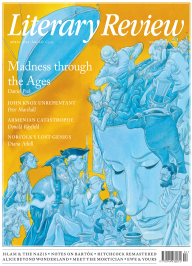Rupert Christiansen
Folk Hero
Béla Bartók
By David Cooper
Yale University Press 456pp £25
Interviewing the great Hungarian conductor Georg Solti many years ago, I remember asking him to nominate the person who had meant most to him in the course of his long and distinguished career. The question was banal enough, but he responded to it with impassioned alacrity, jabbing his finger in the air. ‘Bartók! Because he was a good man!’ There was tremendous emphasis on the adjective and I am glad to see it endorsed by David Cooper’s authoritative and meticulous new study of the composer’s life and works, based on decades of research and reflection and surely destined to rank as a standard for many years to come.
‘Honesty and integrity (sometimes taken to an extreme), fastidiousness, egalitarianism, industriousness and lack of motivation by material success’ are among the qualities that Cooper lists as Bartók’s characteristics. Because these were accompanied by a certain distrait shyness and a refusal to pander or witter, some have been fashionably led to

Sign Up to our newsletter
Receive free articles, highlights from the archive, news, details of prizes, and much more.@Lit_Review
Follow Literary Review on Twitter
Twitter Feed
It wasn’t until 1825 that Pepys’s diary became available for the first time. How it was eventually decrypted and published is a story of subterfuge and duplicity.
Kate Loveman tells the tale.
Kate Loveman - Publishing Pepys
Kate Loveman: Publishing Pepys
literaryreview.co.uk
Arthur Christopher Benson was a pillar of the Edwardian establishment. He was supremely well connected. As his newly published diaries reveal, he was also riotously indiscreet.
Piers Brendon compares Benson’s journals to others from the 20th century.
Piers Brendon - Land of Dopes & Tories
Piers Brendon: Land of Dopes & Tories - The Benson Diaries: Selections from the Diary of Arthur Christopher Benson by Eamon Duffy & Ronald Hyam (edd)
literaryreview.co.uk
Of the siblings Gwen and Augustus John, it is Augustus who has commanded most attention from collectors and connoisseurs.
Was he really the finer artist, asks Tanya Harrod, or is it time Gwen emerged from her brother’s shadow?
Tanya Harrod - Cut from the Same Canvas
Tanya Harrod: Cut from the Same Canvas - Artists, Siblings, Visionaries: The Lives and Loves of Gwen and Augustus John by Judith Mackrell
literaryreview.co.uk